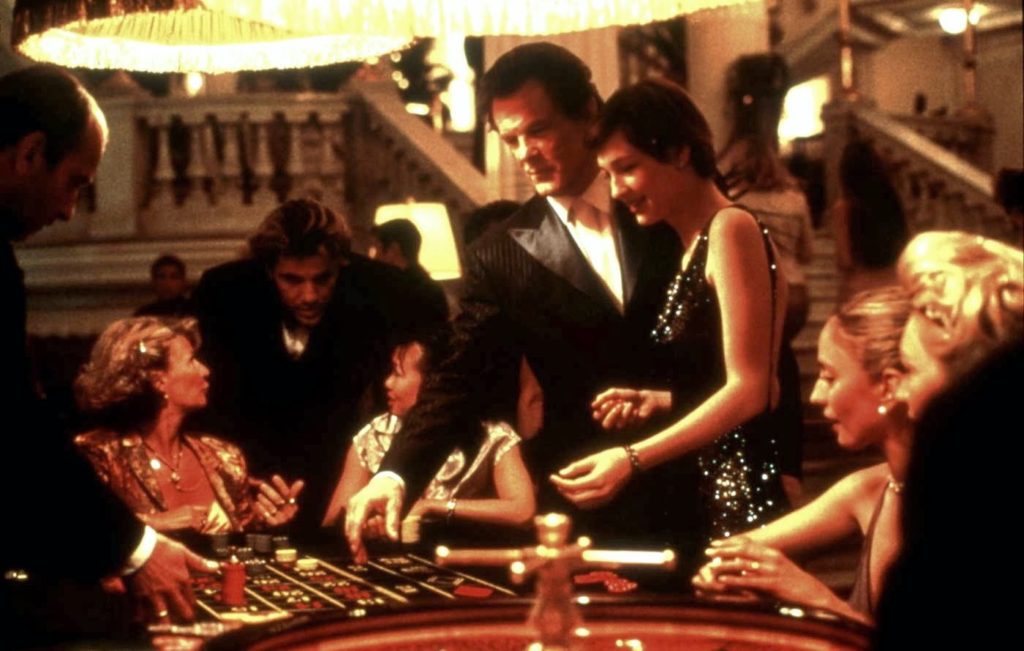At their core, most heist films are a study in how things fall apart. The plan, however meticulous, is torn asunder by some combination of greed, lust, stupidity, or simple bad luck. In “Heat,” if Neil McCauley (Robert De Niro) and his crew had left the bank a minute earlier, they would have gotten away clean from Vincent Hanna (Al Pacino) and his fellow cops. In “The Town,” Doug (Ben Affleck) and his people almost rob Fenway Park, but end up surrounded after Doug’s vengeful ex-girlfriend tips off the cops.
Not all heist films end in tragedy, of course. For example, the audience never doubts that George Clooney and Brad Pitt will get away with the casino’s loot in the remake of “Ocean’s Eleven”; they’re too charming for things to work out otherwise. Spike Lee’s “Inside Man” has great fun playing with heist-movie conventions, convincing you until almost the last minute that Clive Owen’s character is doomed to jail despite all his elaborate plans. In this variation on the theme, the heisters overcome all obstacles with a combination of smarts, luck, and (depending on the film) brutality.
This is all a very roundabout way of saying that Neil Jordan’s “The Good Thief” (2002) is distinctive among heist films because it offers a third path: greed, lust, stupidity and bad luck all colliding to ruin the central heist—and everything still ending happily. For once, fate is kind, not a vicious hammer destroying everyone in its path.
“The Good Thief” is a remake of Jean-Pierre Melville’s “Bob le Flambeur” (1955), an effortlessly cool example of French New Wave, and it follows the plot of that earlier film fairly closely. If you’re new to heist films as a genre, it’s worth noting that some of the aesthetic choices in “The Good Thief” have not aged well. The music, titles, and some of the cinematographic tricks might have seemed cutting-edge at the turn of the century, but now seem hopelessly dated. The dialogue, at moments, tries too hard for a certain laissez-faire cool. Nonetheless, stick with it, even if such things usually bother you; like its main character, the roughness around the film’s edges begins to come off as charming after not too long.
Speaking of that main character: Bob (Nick Nolte) is an addict for gambling, heroin, and knocking off big scores. When the film begins, he’s shuffling around southern France, nearly broke, unable to stop injecting drugs or growling highly suspect life advice at the young criminals circling in his orbit.
One of Bob’s crew turns him onto a new score: A Monte Carlo casino has a museum’s worth of the world’s greatest paintings on its walls. They’re all duplicates, with the originals stored in a highly secure room in a nearby building. Bob’s idea is to trick the police into thinking he’s going to rob the casino itself, when his crew will actually break into that room and take the paintings.

The heist itself is elaborate, demanding that Bob assemble a diverse crew of hackers, crackers, and diggers. Bob, knowing that the police are surveilling him, plans on gambling in the casino while his confederates tunnel their way into the room. For most of the film, it seems like the plan will succeed; but then, as with so many cinematic heists, things begin to fall apart. One of Bob’s crew shoots another man and is forced to flee; another blabs a little too much to the wrong people; and Bob finds himself in debt to a vicious fence (Ralph Fiennes) with a penchant for alliteration.
A different film might have ridden all of those events to a tragic nadir. But in this one, things work out beautifully for everyone in the end; the tunnelers’ cascading bad luck accidentally saves them, while Bob enjoys an unexpected streak of extraordinary luck at the tables. It’s about as uplifting as noir gets. It’s also a tonal universe away from “Bob le Flambeur,” which concludes on a note of mordant irony (it’s Melville; how could it not?). And that makes it the perfect noir for a year marked by pandemic, political uncertainty, and a crashed economy—there’s only so much negativity anyone can take.
___________________________________
Check out “The 50 Most Iconic Heist Movies, Ranked”

















